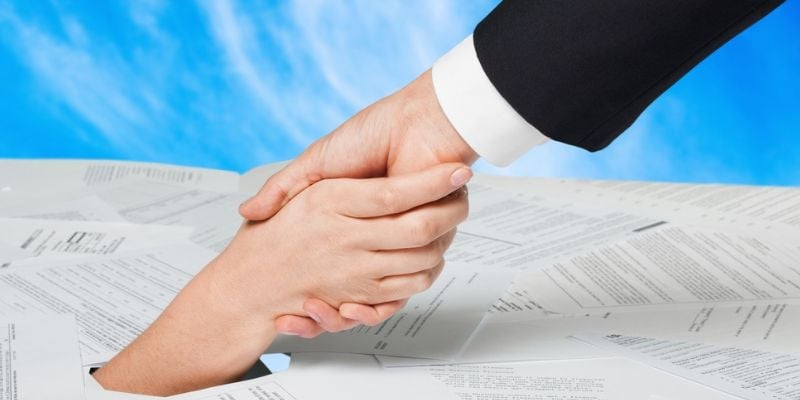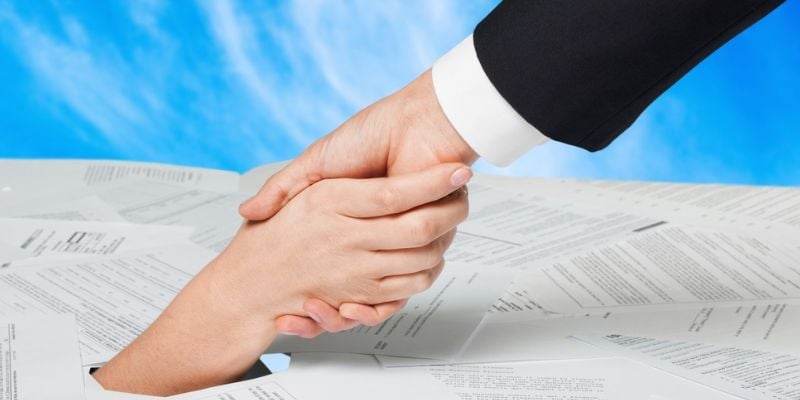5 min read
Economic Injury Disaster Loan (EIDL) Forgiveness or Renegotiation – How It Works
![]() Rob Misheloff
Apr 11, 2023 12:48:41 PM
Rob Misheloff
Apr 11, 2023 12:48:41 PM


The economic turmoil caused by the coronavirus pandemic has had an impact on small businesses everywhere.
The Economic Injury Disaster Loan (EIDL) Program has been a lifeline for many of these business owners, but unfortunately, some are now finding themselves unable to make loan payments due to reduced income or unexpected hardships.
Did you know that there are options available to help you renegotiate or have your loan forgiven?
Do I have to pay my Covid EIDL loan back?
Did you get an Economic Injury Disaster Loan (EIDL) during the COVID-19 pandemic?
So… EIDL loans are not forgiven like PPP loans, so businesses are required to repay them.
But… there may be options for loan forgiveness or renegotiation available to some borrowers.
If you can demonstrate that you truly have no way to repay your EIDL loan, the government may consider taking something less than the full balance.
To determine your course of action, consider the following questions:
- Did you personally guarantee your SBA EIDL Loan?
- What collateral did you pledge, and how much is it worth?
- Can you afford to repay the EIDL loan?
- Do you plan to keep the business open, or will you close it?
- Do you have other debt (SBA and non-SBA) that would need to be settled too?
Depending on your answers to these questions, you may want to schedule a case evaluation to discuss your options further.
While the federal government has not yet announced any plans for blanket EIDL loan forgiveness, it's possible that as the 2024 election approaches, they may consider forgiving a portion of these loans.
Even if they don't provide blanket forgiveness, it's possible that borrowers who apply for forgiveness could receive some level of forgiveness automatically.
If you are asked to make monthly payments on your EIDL loan, be aware that there are no promises of any settlement terms in the future.
This means that you could be making payments indefinitely and still have the government take collection action against you.
So… while EIDL loans are not forgiven like PPP loans, there may be options for loan forgiveness or renegotiation available to some borrowers.
If you are struggling to repay your EIDL loan, consider scheduling a case evaluation to discuss your options further.
What are the repayment terms for EIDL Loans?
Repayment terms for an EIDL loan can vary depending on the loan amount and your financial situation. Generally, loans are due in full after 10 years with a maximum interest rate of 3.75%.
However, if you are having trouble making your payments, there are options available for loan forgiveness or renegotiation.
Let's take a closer look at these options:
EIDL Loan Forgiveness
The Small Business Administration (SBA) offers loan forgiveness for some borrowers who have received an EIDL.
This means that the borrower is no longer responsible for repaying the loan. However, it is important to note that loan forgiveness is not guaranteed and only available under certain circumstances.
To qualify for loan forgiveness, you must meet specific criteria based on the type of loan you received.
For example, if you received an EIDL Advance, you may be eligible for forgiveness of up to $10,000. This advance is designed to provide emergency funds to small business owners affected by the COVID-19 pandemic.
EIDL Loan Renegotiation
If you are struggling to make your loan payments, you may be able to negotiate a different repayment plan with the SBA. This could include a restructured repayment plan with lower monthly payments, a longer repayment term, or even loan forgiveness.
Loan renegotiation is not guaranteed and will depend on your individual circumstances. However, if you are having trouble making your payments, it is important to reach out to the SBA as soon as possible. They may be able to help you find a solution that works for your current financial situation.
Tax Implications of EIDL Loan Renegotiation
It is also important to consider the tax implications of loan forgiveness. Forgiveness of a loan will generally be treated as income and subject to taxation. This means that you may be required to pay taxes on the amount of the loan that was forgiven.
If you have received an EIDL and are having trouble making your payments, it is important to explore your options for loan forgiveness or renegotiation.
The SBA offers a variety of solutions that can help you manage your debt and get back on track. Remember to reach out to the SBA as soon as possible if you are struggling with your loan payments to ensure that you have the best chance of finding a solution that works for you.
What are the consequences of not paying an EIDL Loan?
If you've taken out an EIDL loan and are struggling to make payments, it's important to understand the consequences and explore your options for forgiveness or renegotiation.
Not repaying your EIDL loan on time can result in late fees and additional interest charges. This can add up quickly and make it even harder to stay on top of your payments.
In addition, if you default on the loan, the Small Business Administration (SBA) may take legal action against you to recover the full amount of the loan plus any accrued interest. The SBA can place a lien on your assets, such as property or equipment, or garnish your wages to collect on the loan.
Lastly… if your loan was over $250,000… you probably had to put up collateral. If you don’t pay and don’t renegotiate… the government will take that collateral.
A default on your EIDL loan can also hurt your credit score. This can make it more difficult to obtain loans or other financing in the future, which can be devastating for small business owners who need access to capital to grow and thrive.
What If I Can’t Repay My EIDL Loan?
EIDL Loan Forgiveness
One option for borrowers who are unable to repay their EIDL is loan forgiveness. This means that the Small Business Administration (SBA) will cancel some or all of your outstanding loan balance, effectively relieving you of the obligation to repay the debt. However, loan forgiveness is not automatic and is only available in certain circumstances.
To be eligible for loan forgiveness, you must meet certain criteria established by the SBA. These criteria include demonstrating that you have used the loan proceeds for eligible expenses, such as payroll costs, rent, utilities, and other business-related expenses. Additionally, you must show that you have suffered a substantial economic injury because of the COVID-19 pandemic.
If you believe you meet the eligibility requirements for loan forgiveness, you should contact the SBA to discuss your options. Keep in mind that loan forgiveness is not guaranteed and will depend on your individual circumstances.
Loan Renegotiation
Another option for borrowers who are struggling to repay their EIDL is loan renegotiation. This means that you can work with the SBA to modify the terms of your loan, such as the interest rate, repayment period, or monthly payment amount.
Loan renegotiation can be a good option if you are still able to make payments on your loan but need some flexibility to manage your cash flow. By extending the repayment period or reducing your monthly payment amount, you can free up funds to reinvest in your business or cover other expenses.
To request loan renegotiation, you should contact the SBA and provide them with updated financial information about your business. The SBA will then review your financial situation and determine whether loan renegotiation is a viable option for you.
Other Options
If neither loan forgiveness nor loan renegotiation is a viable option for you, there are other strategies you can use to manage your debt.
These include:
- Refinancing your loan with a private lender
- Seeking debt counseling or financial coaching
- Negotiating a repayment plan with the SBA
It is important to remember that defaulting on your EIDL can have serious consequences, including damage to your credit score and legal action by the SBA. If you are having difficulty repaying your loan, it is important to explore your options and find a solution that works best for you.
In some cases, you may not qualify for loan forgiveness or renegotiation.
If this is the case, it's important to explore other options to manage your debt. This may include seeking out additional sources of funding, such as grants or loans from other lenders. You may also want to consider restructuring your business or seeking out financial counseling to help you develop a plan for managing your debt.
Speak to an Experienced Financial Advisor
If you are struggling to make your EIDL loan payments, it's important to speak to an experienced financial advisor to discuss all of your options.
They can help you understand the pros and cons of loan forgiveness and renegotiation, and can help you explore other options to manage your debt. With the right guidance and support, you can find a solution that works for your business and helps you move forward with confidence.
To Get Help With an EIDL Loan, please call (800) 786-5696 or click the picture below.

